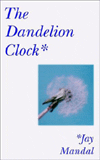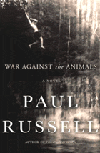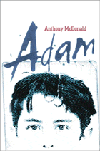 Our man from England,
Tony Heyes, is back with more inimitable reviews. Our man from England,
Tony Heyes, is back with more inimitable reviews. This time, he reviews: Adam
by Anthony McDonald
Dandelion
Clock by Jay Mandal
War
Against the Animals by Paul Russell
|
 The Dandelion Clock by Jay Mandal BeWrite Books 2002 ISBN: 1-904224-25-3 Not So Brief Encounter When I was a teenager (not quite when Victoria was Queen; it just seems that long) gay books as a separate genre did not exist. Those books that did deal with the topic of homosexuality were depressing beyond belief. All relationships were doomed and suicide more often than not was their outcome. A friend of mine vowed never to read another gay book saying he was sick of reading about people wading out to sea. Authors had internalised society’s disapproval and poured all their self-loathing into their work. Most of their readers must have been ready for the river by the time they reached the final page. Notable exceptions were Mary Renault’s historical novels but even Miss Renault felt unable to let her characters lead happy lives in her contemporary novels. Things began to change in the 1970s as we got the coming out novel and the cruising novel. As a genre the coming out novel has entertained and encouraged many young gay people, helping them to cope and realise that their experiences are not unique. About the cruising novel the less said the better. None of its characters can be said to be ideal material for a role model. What all these novels have in common is an element of struggle and conflict with society at large. On concluding them one sighs with relief at another battle won. Consequently it comes as a refreshing change to read Jay Mandal’s “The Dandelion Clock” which can best be described as a love story. The novel is set in the Thames Valley in 1986, a time when the age of consent for homosexuality in England and Wales (Scotland has a separate legal system) was twenty-one. It has since been lowered to sixteen. It opens with a chance meeting on Waterloo Station in London. A young office worker, David Rees, is approached by a teenager, Rob Greenaway, who has left home in unexplained circumstances and is clearly in need of help. Impulsively David, who is house sitting for his parents who are in America, offers Rob a bed for the night. Rob is extremely wary and asks David point blank if he is homosexual. David says that he is so Rob declines the invitation. Desperation then gets the better of him and he accepts. David is an honourable man and his intentions are as altruistic as they can be in the circumstances. He is attracted to Rob but assumes that he is heterosexual and has no designs on him. Rob gets a job, stays on at David’s and David falls in love with him. They jog along happily together for twelve months until David’s parents return and Rob finds another place. His leaving breaks David’s heart. Even though their relationship has been platonic he has been content silently to worship Rob. Twelve months elapse. There is no contact between them apart from the odd ‘phone call at Christmas and birthdays as David feels he’ll never get over Rob unless there is a clean break. His parents go abroad again and Rob immediately turns upon the doorstep asking to come back. David says that’s not a good idea “Because I love you. And because I want you”. Rob then astonishes him by saying that although he doesn’t love him he’ll be quite happy to sleep with him. He too is gay. David, on the principle that half a loaf is better than no bread, agrees to let him return. This is when the story really develops. Rob has demons of his own, a haunted past he’s never discussed with anyone and is two years younger than he has admitted to being. The resolution of their difficulties and the development of their relationship is a faltering affair, fraught with misunderstanding, unresolved anguish and misdirected anger. This is an unusual novel. The development of the relationship is shown in what is often little more than (utterly convincing) inconsequential chit-chat. The misunderstandings between the couple, tentative explorations of unknown emotional territory and the fear of saying the wrong thing characteristic of young lovers are portrayed with real truth and subtlety. Mr. Mandal also tells the story with great humour. There are many very funny moments and witty remarks. David and Rob are not two against the world – they have the support of their families and friends – but are fighting to survive as a couple and forge a future together despite their shaky start and unresolved issues. All the drama is psychological. This is an extremely enjoyable and reassuring read and I look forward to more from Mr. Mandal in the same vein. Those of us who lead lives of unobtrusive contentment need our authors too! |
 War
Against the Animals War
Against the Animalsby Paul Russell St. Martin’s Press 2003 ISBN: 0-312-20935-5 A few months ago in England a court case was headline news in all the papers. A recently qualified teacher was accused of having sexual relations with several underage boys at her school. A number of articles of the “nudge, nudge; wink, wink” variety appeared in which various journalists reflected droolingly on the case, saying this situation was the realisation of their own schoolboy fantasies. How much better their lives would have been if only one of their nubile schoolteachers had initiated them into the mysteries of sex. How civilising it was for a younger boy to be taken in hand, as it were, by a maturer woman. The burden of these articles was that they couldn’t understand what all the fuss was about and the boys should think themselves lucky. At the time I wondered whether they would have taken the same line had the boys been the focus of the attentions of a gay man. Would his actions have been regarded as equally civilising or would the boys be regarded as the innocent victims of a depraved pervert? This question re-presented itself when I recently read Paul Russell’s “The Coming Storm” which treats of such a situation. Although in that novel the boy is the instigator of the action, in law the older teacher is viewed as “the criminal”. This question of the age of consent is a vexed question, redolent of steamy tales of the Deep South or of mediaeval betrothals. Mr. Russell in that novel handled the topic grippingly and convincingly but received, as you would expect, a deal of criticism from old maids of both sexes who love to be scandalised. His portrayal of a troubled adolescent coming to terms with his sexuality is wholly believable and although the book does not have a fairy tale ending, neither protagonist drops the other in the brown and sticky and it ends optimistically. So it was with pleasurable anticipation that I took up Mr. Russell’s new book, “War Against the Animals”. It is a more ambitious work in that the motivation of the troubled adolescent at the heart of the story is more mixed and complex. Mr Russell sets himself the task of articulating the thoughts and feelings of an inarticulate, repressed redneck and succeeds brilliantly. The plot, intriguingly, is similar to that of Henry James’ “The Wings of the Dove”. Two people, in this case teenage, redneck brothers, Jesse and Kyle Vanderhof, cynically set out to win the affections of a third party, Cameron Barnes, an older gay man with AIDS, so as to profit thereby. They succeed beyond their wildest dreams. The older man is attracted to the younger brother, Jesse, who is doing some gardening for him. Kyle notices this and eggs Jesse on, feeling that much can be made by one means or another of a close relationship with Cameron, a landscape gardener who has spearheaded the gentrification of this rural backwater by sophisticated, gay city types. The antagonism between the old residents and the newcomers is total and Jesse is placed in an impossible position on the fault line between the two sets of values, family values and those of the “faggots” (who, as we all know, have neither families nor values). Psychologically Jesse straddles a fault line too, since he is attracted to Cameron despite himself. Although the plan succeeds, Cameron is wiser than either boy gives him credit for and Jesse’s victory is Pyrrhic. One is reminded of the Chinese curse with its ascending degrees of malevolence: “May you live in interesting times: may you come to the attention of important people: may the gods answer all your prayers”. Mr. Russell’s book is neither as prolix nor as long-winded as “The Wings of the Dove” and deserves to be read widely. His “treatment” of his theme (to use a Jamesian word!) is masterly, his characterisation is deft and every word tells. The reader’s sympathies are fully engaged from page one and held until the last. Highly recommendable! |
 Adam by Anthony McDonald Gay Men's Press (GMP) ISBN: 1-902852-44-3 Trade Paper 300 pages Millivres Books; (August 2003) ISBN: 1902852443 Anthony McDonald’s previous novel, Orange Bitter, Orange Sweet was, as can be inferred from the title, set in Seville. It was a subtle account of a number of relationships, gay and straight, and of how some were strengthened by adversity whilst others disintegrated. Its many scenes were intensely real and psychologically believable. His second novel, “Adam”, moves from Spain to France (Mr. McDonald is, among other things, a travel writer) and is more narrowly focussed. It centres on the exploits of a sixteen year old English schoolboy who is staying in France for twelve months as a result of his father working there on a civil engineering project. Adam has already been sexually involved with one of his schoolmates, Michael, in England, albeit in a casual way. In France he becomes more deeply involved with a young Frenchman, Sylvain, an appropriately named child of nature. Sylvain is not, as some would say, altogether put together. He is what in France would be known as an “innocent”. It later transpires that his spaced-out mental state is in part a result of the drugs he takes to control his epilepsy. Adam, on the other hand is quite a sophisticated young man, doing well at school and an accomplished ‘cellist. Clearly it is the attraction of opposites. Their relationship develops into a summer idyll, although Adam conceals their relationship from his parents, largely on account of its unlikelihood. Things come to a head when Sylvain, realising that Adam will have to return to England, abducts him and takes him to the home of some friends who are away. Adam is complicit in the abduction in that he makes no attempt to escape – he just doesn’t know what to do and knows Sylvain means him no harm. The police become involved but Adam refuses to bring charges and Sylvain is treated as gently as possible, thanks to the intervention of a sympathetic father of one of Adam’s French school friends who is a judge of some importance. Rather unaccountably Adam’s parents part as a result of this. The story is extremely well told and holds the reader’s attention right to the final page. Adam’s shortcomings are recounted (he lies to Sylvain) along with his good points, so he is presented as a fully rounded individual. The portrait of Sylvain is similarly believable. He is indulged by his family because of his condition and this makes his wilfulness more believable than might otherwise have been the case. However, given the intensity of their relationship, Adam’s readiness to have sex with two of his schoolmates when they come to visit him during the summer vacation and the alacrity with which he resumes his activities with Michael by the end of the book rather devalue the importance of his relationship with Sylvain. The reader feels somewhat cheated, going from thinking of their relationship as a grand if foolish passion to wondering if it was just a brief infatuation. Despite this feeling of anticlimax, “Adam” is a beautifully written and well-crafted book and a rewarding read. Contact Tony Heyes about these books. |